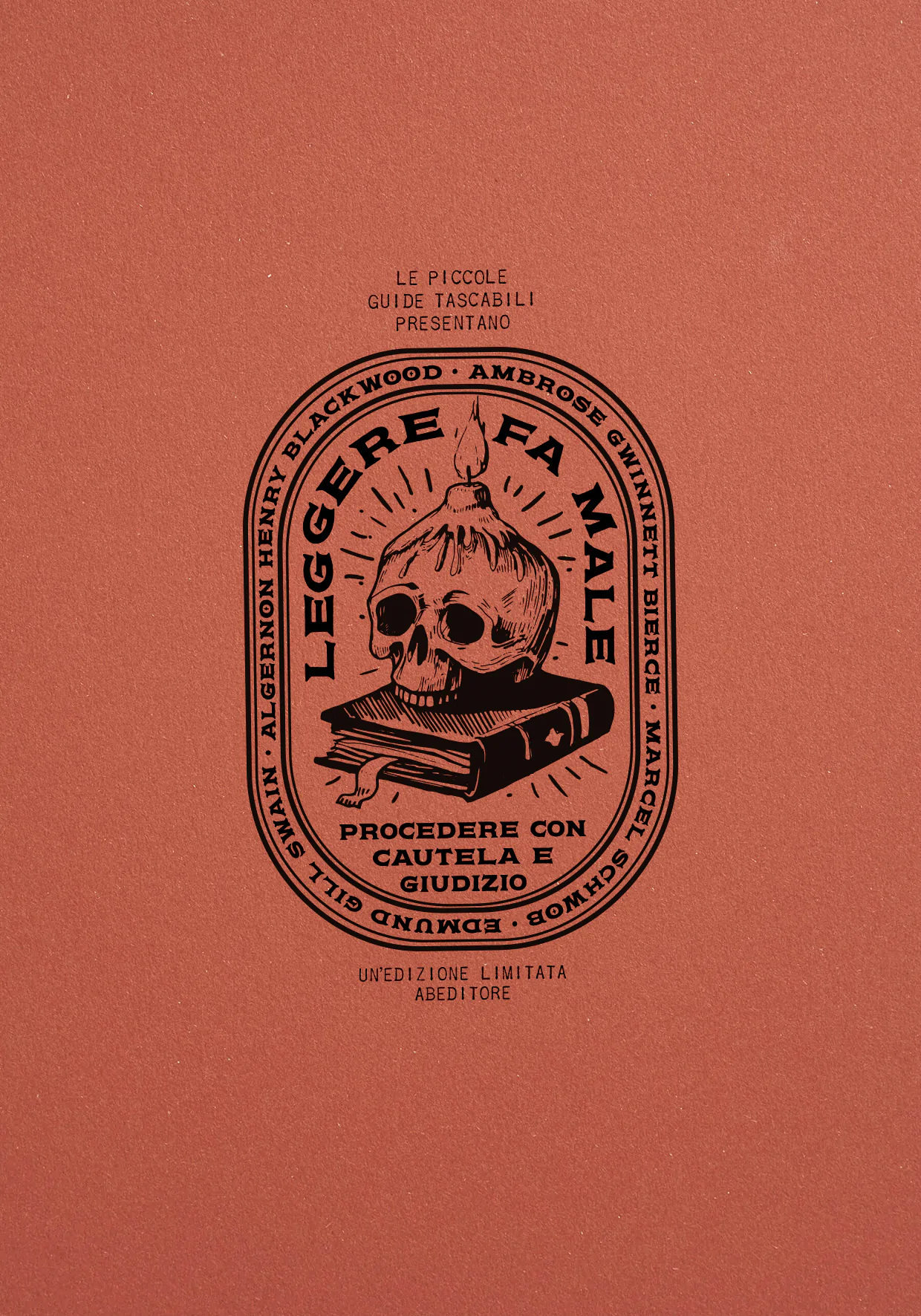
Procedere con cautela e giudizio Edizione limitata con copertina timbrata a mano Quante volte falsi illuminati – imbonitori e affabulatori invero – vi hanno raccontato che leggere fa bene… Ebbene io vi dico: Balle! Bubbole! Chi tra le pagine dei libri ha trovato pace e ristoro è stato solo carezzato dalla fortuna; una biblioteca ben fornita non è una prova di grande coraggio, quanto la nobile maschera di una più sincera incoscienza. Badate, temerari e disgraziati, rifuggite da questo seducente inganno! E se non siete disposti a fidarvi del mio ammonimento, ebbene, sono pronto a mostrarvi quanto aspro e periglioso sia il sentiero che con tanta leggerezza ammalia e corrompe. Avanzate con coraggio; ne avrete bisogno! INDICE Le circostanze adeguate, Ambrose Bierce Lilith, Marcel Schwob Ossa alle ossa, Edmund Gill Swain Sussurranti presenze, Algernon Blackwood
Authors

Blackwood was born in Shooter's Hill (today part of south-east London, but then part of northwest Kent) and educated at Wellington College. His father was a Post Office administrator who, according to Peter Penzoldt, "though not devoid of genuine good-heartedness, had appallingly narrow religious ideas." Blackwood had a varied career, farming in Canada, operating a hotel, as a newspaper reporter in New York City, and, throughout his adult life, an occasional essayist for various periodicals. In his late thirties, he moved back to England and started to write stories of the supernatural. He was very successful, writing at least ten original collections of short stories and eventually appearing on both radio and television to tell them. He also wrote fourteen novels, several children's books, and a number of plays, most of which were produced but not published. He was an avid lover of nature and the outdoors, and many of his stories reflect this. Lovecraft wrote of Blackwood: "He is the one absolute and unquestioned master of weird atmosphere." His powerful story "The Willows," which effectively describes another dimension impinging upon our own, was reckoned by Lovecraft to be not only "foremost of all" Blackwood's tales but the best "weird tale" of all time. Among his thirty-odd books, Blackwood wrote a series of stories and short novels published as John Silence, Physician Extraordinary (1908), which featured a "psychic detective" who combined the skills of a Sherlock Holmes and a psychic medium. Blackwood also wrote light fantasy and juvenile books. The son of a preacher, Blackwood had a life-long interest in the supernatural, the occult, and spiritualism, and firmly believed that humans possess latent psychic powers. The autobiography Episodes Before Thirty (1923) tells of his lean years as a journalist in New York. In the late 1940s, Blackwood had a television program on the BBC on which he read . . . ghost stories!
Edmund Gill Swain was an English cleric and author. As a chaplain of King's College, Cambridge, he was a colleague and contemporary of the scholar and author M. R. James, and a regular member of the select group to whom James delivered his famous annual Christmas Eve reading of a ghost story composed specially for the occasion. Swain collaborated with James on topical skits for amateur performance in Cambridge, but he is known best for the collection of ghost stories he published in 1912, entitled The Stoneground Ghost Tales. He also wrote a history of Peterborough Cathedral. [https://en.m.wikipedia.org/wiki/E._G....]


Ambrose Gwinnett Bierce (1842-1914) was an American editorialist, journalist, short story writer, fabulist and satirist. Today, he is best known for his short story, An Occurrence at Owl Creek Bridge and his satirical lexicon, The Devil's Dictionary. The sardonic view of human nature that informed his work – along with his vehemence as a critic, with his motto "nothing matters" – earned him the nickname "Bitter Bierce." Despite his reputation as a searing critic, however, Bierce was known to encourage younger writers, including poet George Sterling and fiction writer W. C. Morrow. Bierce employed a distinctive style of writing, especially in his stories. This style often embraces an abrupt beginning, dark imagery, vague references to time, limited descriptions, the theme of war, and impossible events. Bierce disappeared in December 1913 at the age of 71. He is believed to have traveled to Mexico to gain a firsthand perspective on that country's ongoing revolution. Despite an abundance of theories, Bierce's ultimate fate remains a mystery. He wrote in one of his final letters: "Good-bye. If you hear of my being stood up against a Mexican stone wall and shot to rags, please know that I think it is a pretty good way to depart this life. It beats old age, disease, or falling down the cellar stairs. To be a Gringo in Mexico—ah, that is euthanasia!"